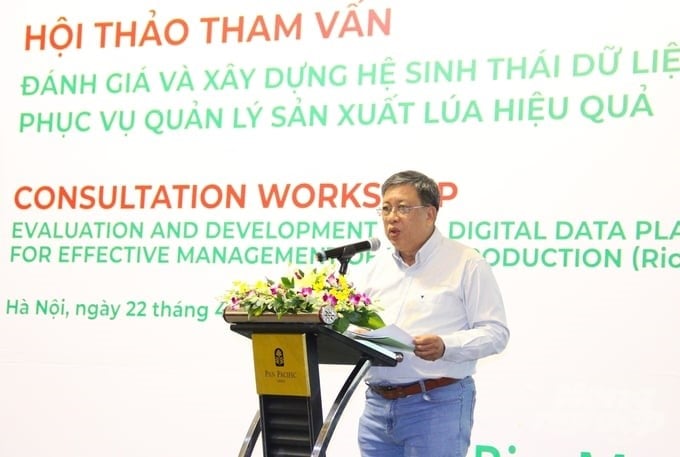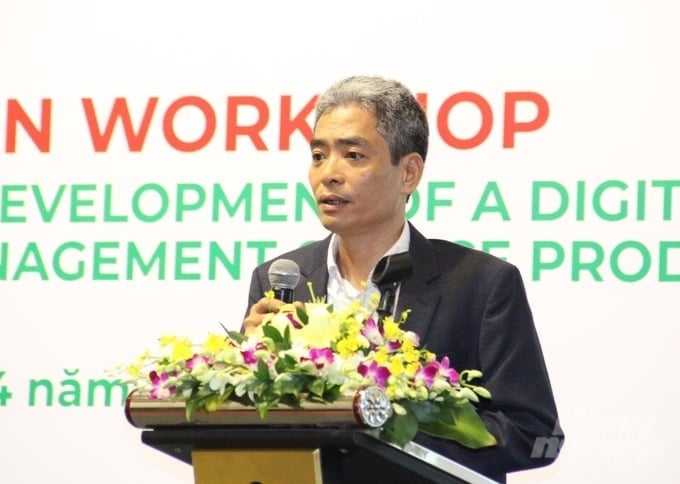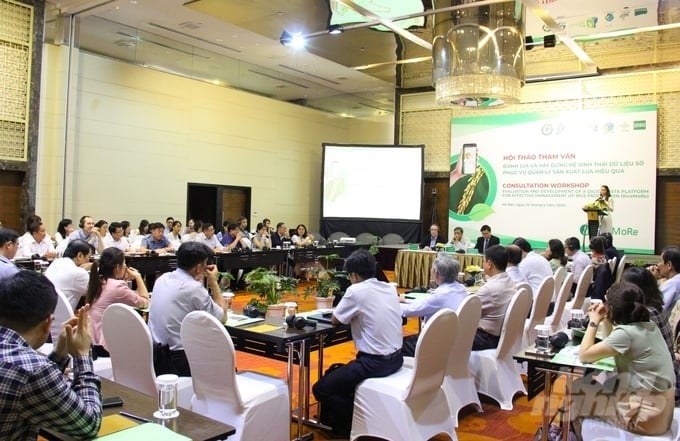November 27, 2025 | 03:09 GMT +7
November 27, 2025 | 03:09 GMT +7
Hotline: 0913.378.918
November 27, 2025 | 03:09 GMT +7
Hotline: 0913.378.918
According to the Department of Crop Production (Ministry of Agriculture and Rural Development—MARD), the plan for digital transformation in the agriculture and rural development sector for the 2022–2025 period (according to Decision No. 2151/QD-BNN-VP dated June 15, 2022) sets the goal that by 2025, 80% of agricultural databases will be developed and updated on a big data platform, with contributions from organizations, individuals, and communities.

According to Mr. Le Thanh Tung, Deputy Director of the Department of Crop Production (photo), reality requires a system that can digitize the crop production industry's data for more effective management. Photo: Trung Quan.
In addition, the agriculture sector has been building important development strategies and projects such as: Sustainable development of 1 million hectares specializing in high-quality and low-emission rice cultivation associated with green growth in the Mekong Delta until 2030; Restructuring Vietnam's rice industry by 2025 and 2030; Developing key fruit trees by 2025 and 2030, etc.
Therefore, it is required for building and implementing a management system for geographical indications, certification marks, collective marks, and products under the OCOP Program associated with registration of growing area codes, food safety, and quality certification; completing the information portal to trace the origin of national products and goods and ensure the information exchange and exploitation needs of domestic and international businesses, organizations, and individuals, etc. These requirements are posing an urgent requirement for the crop production field to build a complete information system and digital database capable of geographical reference.
According to Mr. Le Thanh Tung, Deputy Director of the Department of Crop Production, MARD is now actively promoting digital transformation in the agriculture sector with very specific goals, especially the development of an open data platform with high quality and exploitation value. Meanwhile, monitoring and directing production in the crop production field has elements that can be quantified by sense and experience, but there are also many elements that cannot be done because of a lack of scientific basis.

Mr. Bui Tan Yen, International Rice Research Institute (IRRI), shared about the digital data platform for monitoring and reporting rice production (RiceMoRe). Photo: Trung Quan.
This requires a system that can digitize the crop production industry's data to provide management tools throughout from central to local levels to help manage more effectively on a large scale, on many types of crops in the same space and time, and make the fastest and most accurate production decisions. From there, minimize unexpected results during the production process.
At the workshop, Mr. Bui Tan Yen (International Rice Research Institute, IRRI) shared about the digital data platform for monitoring and reporting rice production (RiceMoRe). This is a geographical reference platform that allows standardization and recording of rice production data over time. The platform has been developed, tested, and perfected since 2018 with the participation of the Department of Agriculture and Rural Development of the Mekong Delta and Red River Delta provinces.
After the process of perfecting, as of now, the system has been introduced and put into application in 10 provinces and cities nationwide. This system automatically synthesizes data at different management levels, helping to significantly improve the rice production statistical and reporting processes.
The RiceMoRe digital ecosystem was developed with support from the New Zealand Agricultural Greenhouse Gas Research Centre, the CGIAR Initiative on Mitigation and Transition to Reduce Greenhouse Gas Emissions of Agricultural Systems (MITIGATE+), the CGIAR Initiative on Securing the Food Systems of Asian Mega-Deltas (Asian Mega-Deltas), and the Agroecological Transition Program for Building Resilient and Inclusive Agricultural Food Systems (Transitions) funded by IFAD-EU.
RiceMoRe has components for storing and processing production data, helping to calculate greenhouse gas emissions in rice farming from the levels of fields, farmer households, and cooperatives to regional and national levels. Thanks to that, the system has the potential to contribute to the greenhouse gas inventory of the rice industry and national programs related to green growth and greenhouse gas emission reduction.
Since the beginning of 2023, IRRI, in collaboration with the Department of Crop Production and the Center for Agriculture Digital Transformation and Statistics, has upgraded RiceMoRe to an online system with a mobile application. Accordingly, the application is developed for many user groups. At the local level, communes nationwide can submit weekly rice production report data in a standard format to help synthesize and analyze the data easily. The Department of Crop Production and MARD can monitor progress, area distribution by crop, rice variety, and development stage to make immediate decisions (for example, responding to climate risks, controlling pests and diseases, export plans, and investment allocation).

At the workshop, experts, policymakers, and managers evaluated the effectiveness and role of the RiceMoRe system in serving state management in the crop production field. Photo: Trung Quan.
At the regional and national levels, MARD can estimate the potential and goals for reducing greenhouse gas emissions from level II greenhouse gas emission coefficients and specific local natural conditions. Other users, such as businesses and extension agencies, can access information to provide specific recommendations to farmers as well as develop appropriate extension services.
Delegates participating in the workshop assessed that RiceMoRe is a platform with great potential to build a digital data ecosystem in rice production in particular and the crop production industry in general, effectively serving the work of state management.
In addition, the system has the ability to be upgraded and applied to monitor greenhouse gas emission reduction targets within the framework of the Sustainable Development Project of 1 Million Hectares Specializing in High-Quality and Low-Emission Rice Cultivation Associated with Green Growth in the Mekong Delta until 2030.
At the same time, the system has the potential to link with other systems, tools, and databases of the Ministry of Agriculture and Rural Development to build a unified, effective, flexible, and transparent digital data ecosystem for the crop production industry.
Translated by Thu Huyen
/2025/11/26/4909-2-154329_878.jpg)
(VAN) Pearl grouper farming in HDPE cages not only delivers economic efficiency but also contributes to protecting the environment, creating jobs, and promoting marine-based experiential tourism.

(VAN) The model of making a living under the forest canopy through the agroforestry system in Van Son commune, Bac Ninh province, is expected to generate an annual income of approximately VND 30 million/ha.

(VAN) Many enterprises in Can Tho are harnessing natural energy and reducing greenhouse gas emissions in their production processes, thereby contributing to the promotion of a sustainable green transition.
/2025/11/24/3536-2-112800_176.jpg)
(VAN) Dong Nai now has tens of thousands of hectares of forests certified for sustainable management, and this area will continue to be expanded in the coming period.

(VAN) Vinh Ha hamlet (Dai Xuyen commune, Hanoi) is shifting away from small-scale farming as households adopt bioscurity into their breeder chicken models.

(VAN) Heavy rains make aquatic species more vulnerable to disease. Proactive water management and high-tech systems help farmers prevent outbreaks and protect yields.

(VAN) Greenhouses are shifting production mindsets in Binh Lu commune, enabling farmers to ‘weather the sun and rain’ and secure stable vegetable harvests throughout the year.